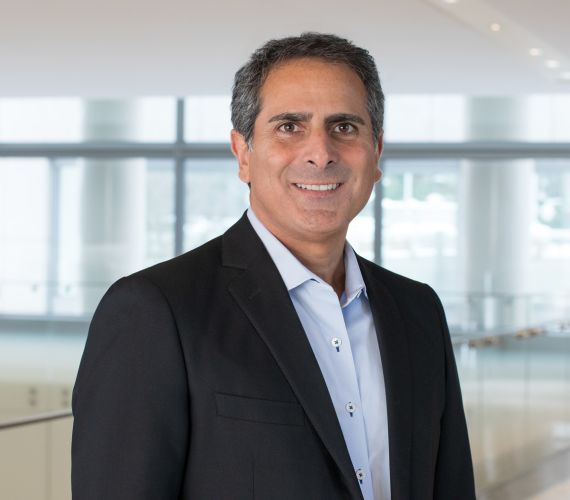Summarize this content to 2000 words in 6 paragraphs
Nader Naini, managing partner at Frazier. (Frazier Photo)
The rise of generative AI and other automation technologies will surely create efficiencies within the $4.5 trillion healthcare industry.
But for early stage startups taking a swing at digital health, it won’t be easy cracking into a sector that’s highly regulated and historically slow to adopt new technologies.
“Everything in healthcare moves at glacial pace,” said Nader Naini, a longtime managing partner at Frazier Healthcare Partners, which recently raised $2.3 billion for its 11th fund.
Naini, who has been at the Seattle-based private equity firm for more than three decades, said he’s seen tech investors become frustrated when they make a move into healthcare.
“You’ve got a system that’s already in place and you’re kind of turning a battleship in a lake,” he told GeekWire in a recent interview.
Another trend that could impede digital health startups is that many healthcare organizations aren’t in a robust financial position and don’t have flexibility to invest in and adopt new technology, Naini said.
“When you’re funding your businesses with venture capital … you can’t tolerate those long sales cycles and long transitions within an organization,” he said.
Venture investors poured more than $10 billion into digital health companies last year, with AI-focused startups taking 37% of total funding, according to Rock Health.
There are a number of Seattle-area tech startups making moves in healthcare, including CalmWave, a “quiet ICU” company that recently raised $5.2 million, and Abbett, which raised $11.6 million to tackle healthcare expenses.
Healthcare-related M&A activity has also been heating up in the region over the past year, for both larger companies such as Accolade and Edifecs, as well as startups including BirchAI and MajorBoost.
And last month, Providence Ventures spun out a new venture capital firm called Allumia Ventures that’s raising a sizable new fund.
Frazier Healthcare focuses on more established businesses that are ripe for automation via new technology such as AI.
“AI is a transformative enabler for the healthcare industry,” Naini said. “However, I wouldn’t go as far as saying it’s going to transform the whole industry. It’s going to be very specific areas in which it can be useful.”
Naini said he expects bigger tech giants such as Microsoft and Amazon to find traction in certain segments of healthcare. But those corporations will also need patience — and perhaps a willingness to fail.
“When you’re reporting quarterly numbers, you better be pretty big so you can absorb a slower-than-expected transformation,” Naini said.
Frazier is particularly interested in sectors including pharmaceutical services, remote care, and women’s health.
The firm, which plans to open a new office in New York City later this year, employs about 90 people and runs an operations team that supports portfolio companies across various disciplines.
Naini said he’s bullish about the macroeconomic climate this year, in part due to the amount of “dry powder” that firms have to deploy.
“I think you’re going to see a lot more activity in 2025,” he said.
Frazier split off into two separate funds in 2013, creating the growth-focused healthcare arm that’s based in Seattle, along with Frazier Life Sciences, which operates venture funds and public funds with a focus on biotech and therapeutics. Frazier Life Sciences, based in Silicon Valley, raised $630 million for its latest fund in October.












